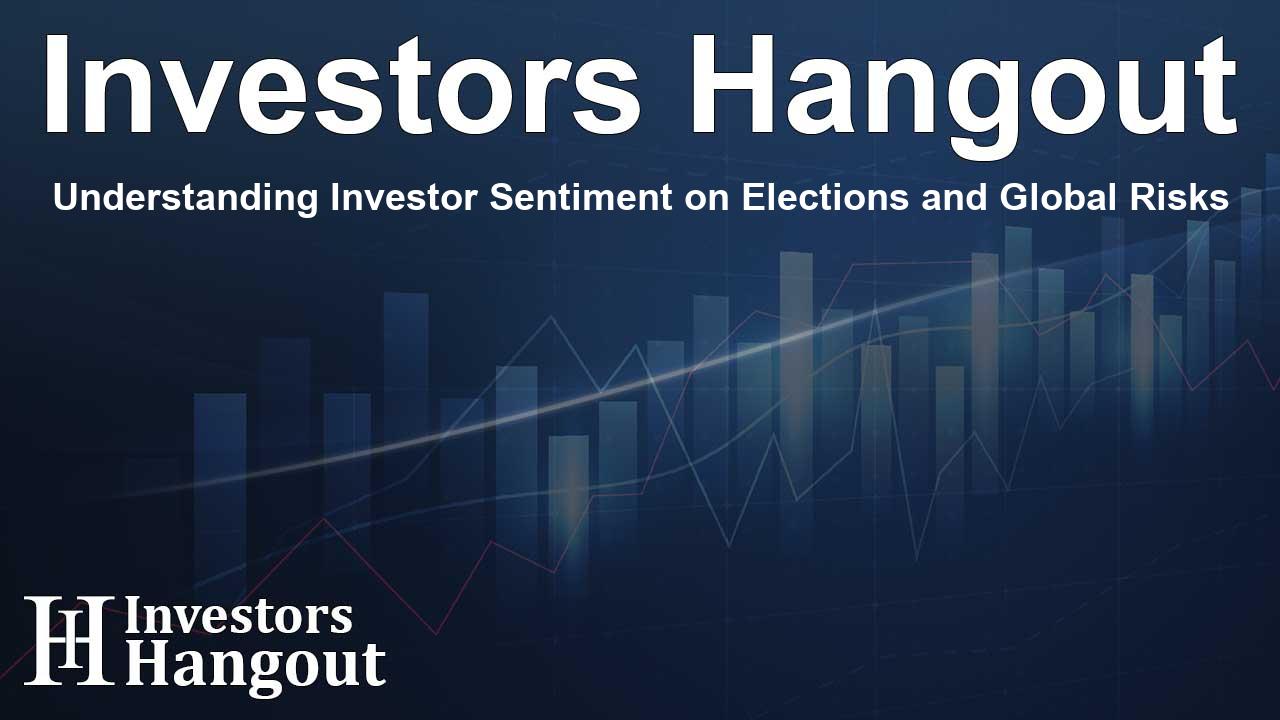Understanding Investor Sentiment on Elections and Global Risks

Investor Insights on Elections and Geopolitical Concerns
Recent discussions among institutional investors reveal that elections and geopolitical risks are becoming prominent concerns. In a landscape filled with uncertainties, investors are adopting a resolute stance, choosing to navigate these challenges while pursuing long-term strategies.
A noteworthy survey has indicated that many investors are remaining optimistic and aggressive despite these worries. Their focus on long-term investment strategies suggests that, while aware of the potential turbulence caused by elections and geopolitical conflicts, they anticipate these factors may only pose short-term challenges.
Geopolitical Risks Surpassing Economic Concerns
The survey highlights that a significant portion of institutional investors, specifically 56%, regard geopolitical risks as the main threat to their investment landscapes. Conflicts such as the instability in the Taiwan Strait and the South China Sea are on their radar, with around 48% noting they are particularly concerned about how these could impact global markets over the next couple of years.
Interestingly, concerns about inflation and recession appear to be diminishing. While inflation continues to be a worry in the U.S. and Europe, the focus has shifted, with many investors contemplating how geopolitical tensions could create more significant disruptions.
“Predicting how political risks might play out is challenging, and history shows they can be transient unless they escalate,” noted Guillermo Felices, a global investment strategist. His insight encapsulates the current sentiment among investors who are preparing for volatility but are not making drastic changes to their strategies.
Effects of Upcoming Elections
With a multitude of elections occurring globally, investors are displaying circumspection regarding the outcomes. In this climate of uncertainty, approximately 56% of investors indicate that the results will influence their decisions. Many are opting to shift capital into cash, a move underscored by a “flight to safety” that is particularly pronounced within the U.S.
Despite this caution, a staggering 75% of institutional investors feel confident that their portfolios are prepared for the ramifications stemming from these pivotal elections.
James Sonne, head of government affairs, commented on the evolving dynamics of the U.S. presidential election, noting a possible lack of dramatic changes. Investors appear well-equipped to handle various possible outcomes without significant disruption.
Strategic Risk Management Approaches
Investors remain mindful of short-term risks while maintaining a proactive approach in seeking opportunities generated by geopolitical changes. A diversified portfolio is key, along with ensuring liquidity, which offers the flexibility needed to adapt swiftly to unforeseen circumstances.
Mao Dong, co-head of portfolio management, emphasizes the importance of a diversified strategic asset allocation aligned with overall investment goals. This helps investors withstand various market scenarios and decreases reliance on any singular investment area.
Additionally, employing a dynamic asset allocation process enables quick adaptation to changes brought on by global events. Integrating quantitative models, real assets, and ongoing stress-testing of portfolio resilience are just a few strategies being utilized to stay ahead.
As the global landscape continues to evolve, institutional investors are finding ways to maneuver through uncertainties while reinforcing their long-term positions with robust strategies and diversified portfolios.
Frequently Asked Questions
What are the main concerns for investors regarding geopolitical risks?
Investors primarily worry about conflicts that could disrupt markets, particularly in areas like the Taiwan Strait and the South China Sea.
How are institutional investors planning to navigate upcoming elections?
They are preparing their portfolios to be flexible, recognizing that election outcomes could impact their strategies but remaining cautious about overreacting.
What percentage of investors are concerned about inflation now?
Concerns about inflation are decreasing, with 38% indicating it as a top issue in the U.S.
How are investors adjusting their portfolios in light of risks?
Many are increasing their cash positions to navigate uncertainties while maintaining aggressive long-term strategies.
What role does portfolio diversification play for investors?
Diversification helps in managing risks and ensuring that no single area overly influences overall performance, especially in turbulent times.
About Investors Hangout
Investors Hangout is a leading online stock forum for financial discussion and learning, offering a wide range of free tools and resources. It draws in traders of all levels, who exchange market knowledge, investigate trading tactics, and keep an eye on industry developments in real time. Featuring financial articles, stock message boards, quotes, charts, company profiles, and live news updates. Through cooperative learning and a wealth of informational resources, it helps users from novices creating their first portfolios to experts honing their techniques. Join Investors Hangout today: https://investorshangout.com/
Disclaimer: The content of this article is solely for general informational purposes only; it does not represent legal, financial, or investment advice. Investors Hangout does not offer financial advice; the author is not a licensed financial advisor. Consult a qualified advisor before making any financial or investment decisions based on this article. The author's interpretation of publicly available data shapes the opinions presented here; as a result, they should not be taken as advice to purchase, sell, or hold any securities mentioned or any other investments. The author does not guarantee the accuracy, completeness, or timeliness of any material, providing it "as is." Information and market conditions may change; past performance is not indicative of future outcomes. If any of the material offered here is inaccurate, please contact us for corrections.